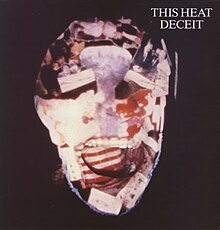Deceit (album)
| Deceit | ||||
|---|---|---|---|---|
 |
||||
| Studio album by This Heat | ||||
| Released | September 1981 | |||
| Recorded | 1981 | |||
| Studio |
|
|||
| Genre | ||||
| Length | 40:45 | |||
| Language | English | |||
| Label | Rough Trade | |||
| Producer | This Heat and David Cunningham | |||
| This Heat chronology | ||||
|
||||
| Additional cover art | ||||

The cover art (as shown in the 1991 CD booklet) reflected This Heat's anxiety about nuclear war.
|
||||
| Professional ratings | |
|---|---|
| Review scores | |
| Source | Rating |
| AllMusic | |
| Pitchfork | 9.0/10 (2001) |
| Pitchfork | 9.1/10 (2016) |
| Tiny Mix Tapes | very favourable |
Deceit is the second and final studio album by English experimental rock band This Heat. It was recorded in 1981 and released in September of the same year by Rough Trade Records. The title is in part a pun on the band's name.
Deceit is regarded as a classic of the post-punk era, and was ranked at number 20 on Pitchfork's list of the greatest albums of the 1980s.
In a 1991 interview, Charles Hayward explained that the threat of nuclear warfare motivated the band and provided the album with an underlying theme: "The whole speak, 'Little Boy', 'Big Boy' [sic], calling missiles cute little names. The whole period was mad! We had a firm belief that we were going to die and the record was made on those terms.… The whole thing was designed to express this sort of fear, angst, which the group was all about, really." The album's subject matter also deals with war and imperialism. The cover art reflects these concerns, and includes a photomontage of images such as mushroom clouds, thematic maps depicting nuclear arsenals and photographs of Ronald Reagan, Leonid Brezhnev and Nikita Khrushchev.
As with other This Heat recordings, much of the album was recorded at Cold Storage, a disused refrigerated storeroom at a former meat pie factory in Acre Lane, Brixton, England. The music included new improvisations along with songs the band had been playing during live performances (portions of these songs were culled from actual concert recordings). As Hayward describes, "some of the album was really plush sounding, some dim and pokey. Sometimes it would sound like the machinery was breaking up. We deliberately would make it sound as though the record player was exploding."
...
Wikipedia
